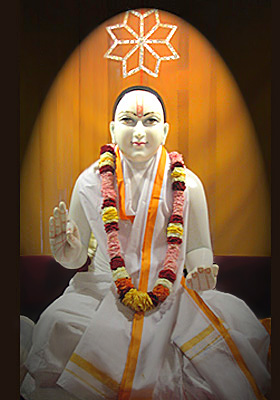Shuddhadvaita Philosophy was expounded against Ramanuja`s Visistadvaita and Adi Shankara`s Advaita Vedanta. His system of thought is also known by the name Brahma Vada. Vallabha says that the entire universe is real and delicately Brahman. The individual souls are in quintessence with Brahman. Jiva, Kala (time) and Prakriti are eternal existences. However they have no separate existence apart from Brahman. Shuddadvaita is the "purely non-dual" philosophy.
The tradition of Shuddhadvaita originated near Vrindavan in the state of Uttar Pradesh. However in modern times followers of Shuddhadvaita are concentrated in the states of Rajasthan and Gujarat. The school of purified non-dualism of Vallabha sees equality in "essence" of the individual self with God. There is no difference between the two. Vallabha does not deny God as the whole and the individual as the part of it. Individual soul is not the Supreme clouded by the force of avidya, but is itself Brahman, with one attribute. The soul is the doer and enjoyer.
The world of Maya is regarded as real. He is the universe itself. Bhakti is the means of attaining salvation. Karmas herald knowledge of the Supreme. The liberated soul can perform all karmas. The ultimate goal is eternal service of Lord Krishna and participation along with his activities in his divine abode. Vallabha distinguishes the inspirational realization of Brahman as Purushottama. He emphasizes on unqualified love and devotion towards God.
Atma-nivedana is bhakti which gives itself up body, heart and soul in the name of God. It is the Bhakti of the devotee who worships God for his own sake. Such a devotee goes would get eternal bliss.
Classification of Souls
Souls are of three types: pure Jivas, worldly jivas and the liberated souls. The divine qualities are not concealed in pure Jivas. Worldly Jivas are caught in the clutches of ignorance. They experience both births and deaths. Liberated souls are freed from the bonds of Samsara through knowledge. When a soul attains final liberation, it recovers repressed qualities and becomes one with Brahman.
The other classification of souls: Pushti souls, Maryada souls and Pravahika souls. Pushti souls are the highest as they are generated from the bliss-body of God. These are the souls of grace. Maryada souls are generated from the Word of God. They are ruled by law. They perform ritual duties with ulterior motives. The Pravahika souls come from the mind of God and they are the Samsaric Jivas. They are moving constantly.
Pushti Marga
 The way of life and salvation that was taught by Vallabhacharya is called Pushti Marga. As the man`s soul has become weak it is in need of God`s grace for its liberation. The Bhakti that is generated through special grace is Pushti Bhakti.
The way of life and salvation that was taught by Vallabhacharya is called Pushti Marga. As the man`s soul has become weak it is in need of God`s grace for its liberation. The Bhakti that is generated through special grace is Pushti Bhakti.
There are four Kinds of Bhakti: Pravaha Pushti-Bhakti, Maryada Pushti-Bhakti, Pushti-Bhakti and Suddha Pushti-Bhakti. Pravaha Pushti Bhakti is the path of those who perform deeds while leading a worldly life which will lead to accomplishment of God-realisation. Maryada Bhakti is the path of those who are fit to gain knowledge which is valuable for worship through God`s grace. In Pushti Bhakti, the devotees lead a self restraint life. Suddha Pushti-Bhakti is the present from of worship when the devotees sing songs in the name of Lord.












